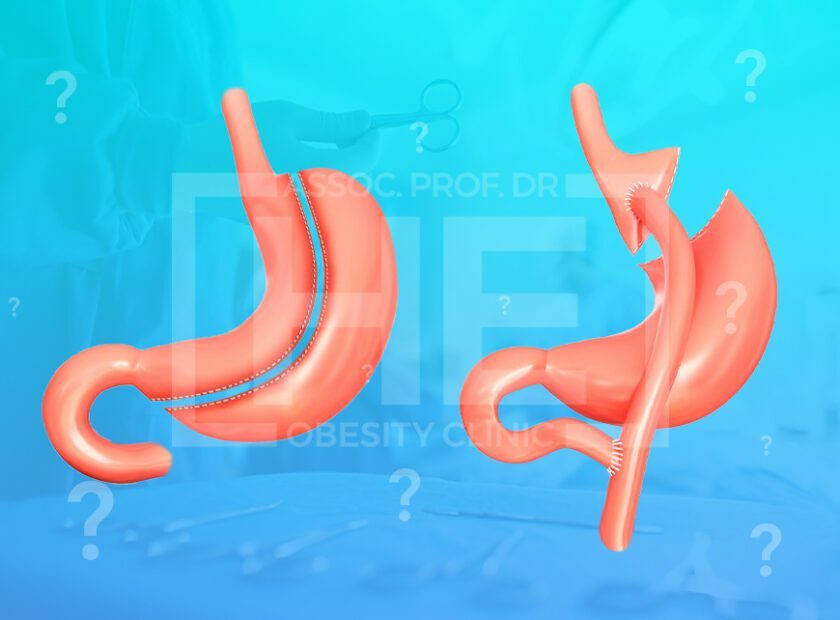What is better the sleeve or gastric bypass? We will examine 2 different surgeries that are most preferred among obesity surgeries. In this Gastric Bypass vs. Gastric Sleeve Surgery article, we will describe the pros and cons of these two surgeries and explain how both surgeries are performed.
In this article, which we prepared for our patients who wonder what the differences are between Gastric sleeve surgery and Gastric Bypass, which are the two most frequently used procedures in Obesity Surgery, and which operation should be preferred for which patients, we tried to compare both methods in the most comprehensive way possible.
What is Gastric Bypass?
Gastric bypass surgery is a surgical procedure that helps people with obesity problems lose weight and improve health problems associated with obesity.
The procedure aims to make changes in the stomach and small intestine, both to eat less and to reduce the absorption of what they eat. Gastric bypass surgery is a procedure that is both restrictive and reduces absorption.
As the volume of the stomach decreases, the patient’s food intake is reduced. In addition, as a result of the absorption of part of the intestine, the patient’s total absorption of calories, protein and other nutrients decreases.
Gastric Bypass Vs Gastric Sleeve Surgery
Gastric sleeve and gastric bypass are two common types of weight loss surgeries, each with its own benefits and considerations. Gastric sleeve, also known as sleeve gastrectomy, involves the removal of a large portion of the stomach, leaving a smaller, banana-shaped stomach. This procedure restricts the amount of food that can be consumed, leading to weight loss. On the other hand, gastric bypass, or Roux-en-Y gastric bypass, involves creating a small pouch from the stomach and connecting it directly to the small intestine, bypassing a large portion of the stomach and the first part of the small intestine. This not only restricts food intake but also reduces the absorption of nutrients, resulting in weight loss. When comparing gastric sleeve vs bypass, both procedures have their own advantages. Gastric sleeve is less invasive and preserves the natural stomach outlet, which may reduce the risk of long-term complications such as vitamin deficiencies. It also does not require rerouting or reconnecting the intestines. On the other hand, gastric bypass typically results in more weight loss compared to gastric sleeve and has been shown to have a higher rate of resolution for obesity-related comorbidities such as type 2 diabetes and high blood pressure.
In terms of gastric bypass vs sleeve, it is important to consider the potential risks and complications associated with each procedure. Gastric bypass carries a higher risk of nutritional deficiencies due to malabsorption, as well as a risk of “dumping syndrome” when high-sugar or high-fat foods are consumed. On the other hand, gastric sleeve may be associated with a higher risk of acid reflux in some patients due to the reduction in stomach size. Both procedures also carry risks such as infection, blood clots, and complications related to anesthesia.
When considering gastric bypass sleeve vs gastric bypass, it is essential to consult with a healthcare professional to determine which procedure is most suitable for individual needs and health conditions. Factors such as BMI, obesity-related health issues, eating habits, and lifestyle should be taken into account when making this decision.
The choice between gastric sleeve vs gastric bypass should be based on a thorough evaluation of the potential risks and benefits of each procedure, as well as individual patient preferences and goals. Both surgeries can be effective in achieving significant weight loss and improving obesity-related health conditions when combined with lifestyle changes such as diet and exercise. It is important for patients to have a comprehensive understanding of the implications of each procedure and to work closely with their healthcare team to make an informed decision.
Comparing Gastric Sleeve and Gastric Bypass
Gastric Bypass Pros
Before deciding to have this surgery, we recommend that you definitely read the following Gastric Bypass Pros:
- Thanks to gastric bypass surgery, the stomach is reduced, both nutrient intake is restricted and nutrient absorption is reduced because the small intestine is cut. Thus, the process of weight loss is accelerated.
- Because the stomach is reduced after gastric bypass, patients begin to satiate faster, although they eat less.
- The risk of joint disorders, sleep apnea, high blood pressure, high cholesterol and heart disease, which can occur due to excess weight, especially diabetes, is reduced.
- Patients may experience a feeling of satiety for longer, as the point at which the new stomach formed during gastric bypass connects to the intestine is narrower than normal.
Gastric Bypass Cons
As with any surgery, gastric bypass surgery has some disadvantages, of course. Here are Gastric Bypass Cons:
- Gastric bypass patients may experience a lack of vitamins and minerals in the medium and long term if they do not comply with nutrition programs. A lack of minerals and vitamins can lead to various health problems such as anemia, hair loss, and decreased novelization.
- After gastric bypass surgery, nausea, constipation and various intestinal problems may occur.
- Hernia formation can be observed at the site of the operation.
- Dumping syndrome can be seen if you eat fast, because the pyloric valves are not protected in this operation.
- Gastric bypass surgery also does not guarantee weight loss or loss of weight.
What is Gastric Sleeve Surgery?
A laparoscopic operation is the process of removing most of the stomach body by preserving a tube-shaped part of the stomach that will ensure continuity with the esophagus and intestines. Gastric Sleeve Surgery mainly aims to reduce the amount of food taken by reducing the volume of the stomach.
Because the normal intestinal tract is maintained, it is a more physiological method and complications due to nutrient absorption disorder do not occur. In recent years, this method has been recognized as an effective obesity surgery alone and has begun to be used.
Gastric Sleeve Surgery Pros
You will understand more clearly why you should have this operation by reading the Gastric Sleeve Surgery Pros below:
- If patients adopt healthy lifestyle habits, they can quickly lose weight and maintain their form.
- As excess pounds go, a serious improvement in secondary health problems occurs.
- After gastric sleeve surgery, patients can eat quickly, even if they consume a small amount of food.
- After surgery, patients ‘ appetite decreases as ghrelin is released in the part of the stomach removed from the body.
- The pyloric valves that control the passage of nutrients into the intestines are preserved during gastric sleeve surgery. Therefore, the risk of dumping syndrome is eliminated.
Gastric Sleeve Surgery Cons
Although it is an important and successful operation, it also has some disadvantages. Here are Gastric Sleeve Surgery Cons:
- During gastric sleeve surgery, the large part of the stomach is permanently removed from the body, and this operation is irreversible.
- If vitamin supplements are not taken after surgery and the doctor’s instructions are not complied with, the balance of metabolism may be disturbed.
- If healthy lifestyle habits are not acquired after gastric sleeve surgery, patients may not lose enough weight or regain the weight they gave. This disadvantage applies to all gastric reduction surgeries.
- If performed by experienced surgeons, the risk of leakage after gastric sleeve surgery is minimized, however, the possibility of leakage in the stomach should be evaluated in the process before the operation.
Given the information we have provided so far, you understand that there is no clear answer to this question, and one of the methods is certainly better.
Although tube stomach surgery is generally preferred because of lower complication rates, faster recovery, easier surgery, and cheaper, we also offer this method as an option for patients who are thought to benefit more from Gastric Bypass.
A patient who needs obesity surgery should be informed about both procedures in all aspects, and together with the patient, the patient should decide on the most appropriate method. Instead of a surgeon who performs only one procedure, it will also be in your best interest to choose a surgeon who can perform both procedures and has knowledge.
In the studies, BMI, Hba1c levels were followed for 5 years by dividing diabetics into groups and performing tube stomach and gastric bypass surgery, serious articles were written on the results and very serious differences were not found.
What is the difference between the sleeve and gastric bypass?
In fact, every doctor can answer this question differently. Because there are experts who consider both surgeries successful.
Although gastric sleeve surgery is generally preferred because of lower complication rates, faster recovery, easier surgery, and cheaper, this method is offered as an option to patients who are thought to benefit more from Gastric Bypass.
A patient who needs obesity surgery should be informed about both procedures in all aspects, and together with the patient, the patient should decide on the most appropriate method.
Instead of a surgeon who performs only one procedure, it will also be in your best interest to choose a surgeon who can perform both procedures and has knowledge.
Is gastric sleeve less invasive than bypass?
Sleeve gastrectomy, also called gastric sleeve, is an option for patients who are not eligible to undergo more radical bariatric procedures. It can be an independent operation to lose excess weight, or the first part of a two-stage procedure, which involves a subsequent operation.
On the other hand, gastric bypass is a much more invasive procedure aimed at reducing the size of the stomach by surgically creating a small pocket in the stomach.
Comparing gastric bypass surgery and gastric sleeve surgery to find out the differences between them will help you make a healthy decision. The recovery period will depend on the type of procedure. In general, the more invasive the procedure, the longer the recovery period.
Is gastric bypass or gastric sleeve better?
Gastric bypass is more advantageous for diabetes patients than gastric sleeve surgery. Because the stomach connects to the small intestine, sugar absorption decreases, and intestinal hormone secretion increases, and insulin values increase. Patients suffering from severe reflux get rid of these complaints after gastric bypass.
Which one is cheaper? Gastric bypass or gastric sleeve?
The content and application method of both surgeries are different. Of course, the prices are also different. But we want you to know that the patient’s condition is evaluated while determining the price in bariatric surgeries.
There is no standard price for any surgery. The patient’s weight, age, and even gender can alter the procedure of the surgery. This naturally causes prices to change. Briefly; you may need to have an examination first to find out which surgery is cheaper.
However, you should know that the prices are much cheaper in Turkey. It is possible to have these two surgeries in Turkey cheaper than European countries. Just call us for current prices and payment terms.
Which is the Most Effective Weight Loss Surgery?
There are many weight loss surgeries, both surgical and non-surgical, but which one is the most effective depends on the circumstances of the patient. These procedures all have their advantages and disadvantages.
The good news is that they all reduce weight and improve health, but some are better for certain people. Read on to learn more about the pros and cons of each option. Then make an informed decision about which one is right for you.
Although the results of weight loss surgery are not 100%, they are usually very impressive. Surgical patients typically lose a large portion of their excess weight in the first year and continue to do so for the next 18-24 months.
Similarly, patients who had Type 2 diabetes tend to lose less weight overall, but are more likely to achieve and maintain their ideal body weight. Overall, bariatric surgery improves the health of patients by reducing or eliminating many medical problems related to obesity.
This surgery alters the digestive tract by cutting the top part of the stomach and small intestine. This bypass allows food to pass through the intestines more quickly, reducing the amount of calories consumed. It is reversible and minimally invasive.
Adjustable gastric bands are silicone bands that create a small pouch above the band. The benefits are numerous. Ultimately, it is the best way to lose excess weight.





